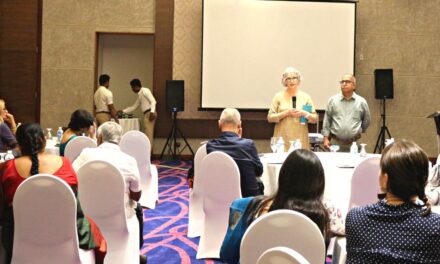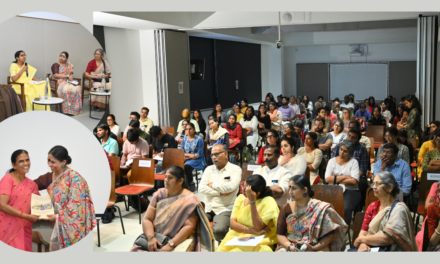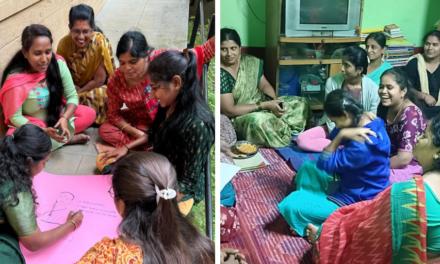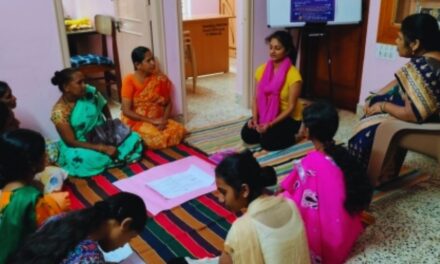As Bengaluru-based Namasthe Exports Readies To Shut Down, Long-Time Workers Reminisce About The Workplace That Gave Them Stability, Dignity & The Occassional Masala Dosai Treat
For over 40 years, Namasthe Exports wasn’t your typical readymade garment factory in Bangalore. Here, workers like Vishaka*, a 51-year-old tailor who has worked for 23 years, stitched together garments and a life of dignity. Unlike other factories, Namasthe wasn’t a place of constant pressure and humiliation. Targets were achievable, and breaks were a right, not a privilege. The workers received overtime wages, bonuses, social security benefits, and medical leave.
The fact that salaries were just equal to the industry’s minimum wage** was not lost on the workers. Nagamma, a 54-year-old tailor for the last 34 years at Namasthe, started at a mere Rs. 350 a month in 1990. With regular minimum wage increases, her current salary, after deductions for social security (ESI) and provident fund (PF), is around Rs. 9,500-10,000. This is hardly a fortune, but it provided stability. Very few workers have quit. A majority of them have completed more than 25 years of service as helpers, tailors, and packers.
A Culture of Respect Built Over Decades
‘‘Respect Channagite’’ (Respect is good) is how Nagamma described the work environment. Unlike typical garment factories, leather apparel requires more time and effort. Accordingly, achievable targets of 35-40 pieces a day were set per worker, with the understanding that quality mattered more than breakneck speed. There was a sense of mutuality. “We worked long hours overtime, gave it our all,” said Lakshmi (53), another tailor. The factory looked after them with coffee, tea, and lunch breaks. ‘‘Masala dosais were provided on Sundays when there was extra work,” she added. The best of all: “Even if we reached work a half-hour late in case of emergencies, we could seek permission and enter,” she added.
The owner, Mr. C.M. Bhat played a pivotal role in shaping this positive environment, said workers, who remembered his support fondly. When Lakshmi, as a young woman in 1990, wanted to marry a colleague from a different caste, Mr. Bhat, though initially hesitant, offered them a loan for their marriage function.
Many from Namasthe were also active in a fledgling garment worker union in the city, in the early 2000s. “The owner knew about our union meetings, but he never stopped us. He requested us to bring our problems to him directly, rather than through the union.” said Lakshmi.
A Supportive Ecosystem
Yashodamma P.H, head of Munnade Trust, a worker support organisation, echoed the workers’ experiences. “The factory even had a childcare facility, a rarity in the industry, allowing mothers to work without worry,” she said. She spoke of how this concern extended to their children’s futures. “The factory used to announce state scholarships that workers’ children were eligible for and even helped with applications.”
Working with leather, a tough material, can lead to injuries. Here too, Namasthe stood out. “The factory used to reimburse private medical costs if any worker experienced occupational injuries,” she added.
A Shift In Workplace Conditions
Workers spoke of how this environment changed, most notably after Mr. Bhat’s passing in 2010. “They started expecting us to finish targets faster,” said Lakshmi. Requests for wage increments and advances were also not encouraged.
The workplace changes also coincided with a period of financial instability. A factory that once employed over a 1000 workers across 4 units, downsized to 1 unit and 150 workers in 2024, said workers. Work orders have also reduced as reported by workers. ”When the owner was there, we used to get OT (overtime) work almost everyday, and the OT payments allowed us to earn above our regular salaries. But now I get OT for a maximum of three months a year,” said Nagamma.
An Uncertain Future Looms
With the factory shutting down, the future looks bleak for these long-serving employees. Workers said that many of them have been asked to resign, and take pre-decided settlements. Though the company officials were approached for comments, they are yet to get back. Many like Rama, a 54-year old helper who started working here at 17, seemed unwilling to accept the new reality. “Old people like us will not get jobs anywhere else. We requested an extra salary for three months and that has not come through,” she said. Another helper, Manjula (52), spoke of how she is the primary earner taking care of her husband’s medical costs and daughter’s college fee.
A Legacy of Dignity
While the future remains uncertain for the displaced workers, Namasthe is still remembered by its workers as a safe and welcoming workplace. Others attested to this: “Over the couple of decades we have known the factory, we have found the humane approach of the management remarkable in an otherwise atrocious work environment,” said the Director (Strategy), Cividep India.
Yashodamma also spoke of what was perhaps the most enduring testament to the factory’s support to its oldest workers. “What I find unique is that many of the children of Namasthe workers have gone on to become engineers, doctors and other highly qualified professionals,” she said.
(*Names changed to protect privacy. As of August 2024, all production activity seems to have stopped at the factory . We will update the blog when we get responses from the management.)
(**Minimum wages in the garment sector in Karnataka (basic plus DA) is Rs. 10,330. According to Asia Floor Wage Alliance and Trade Unions, workers in this sector require living wages that are at least three times their current earnings to cover essential needs such as housing, food, healthcare, education, and savings for contingencies (estimated at Rs. 33,920 p.m.)





